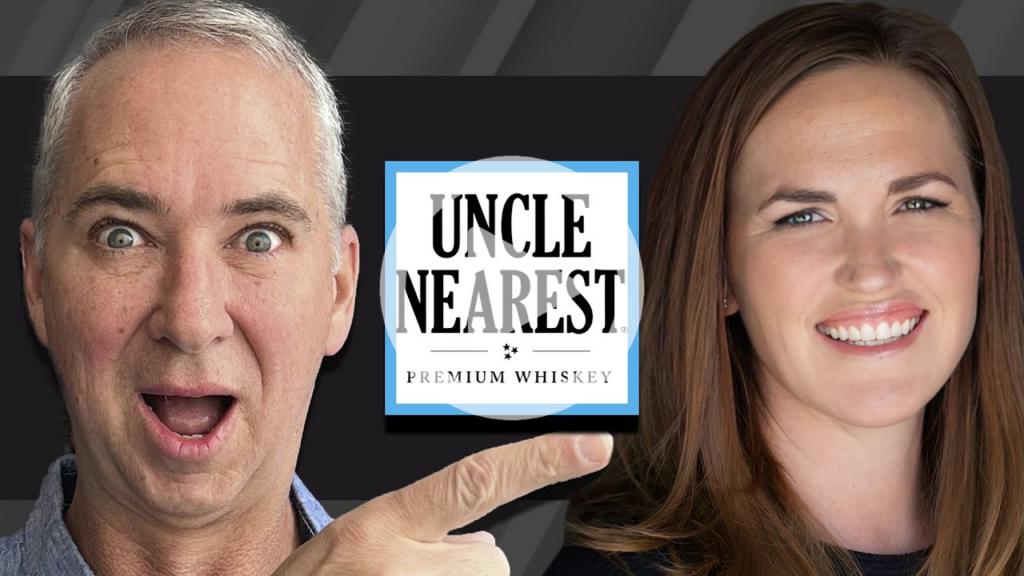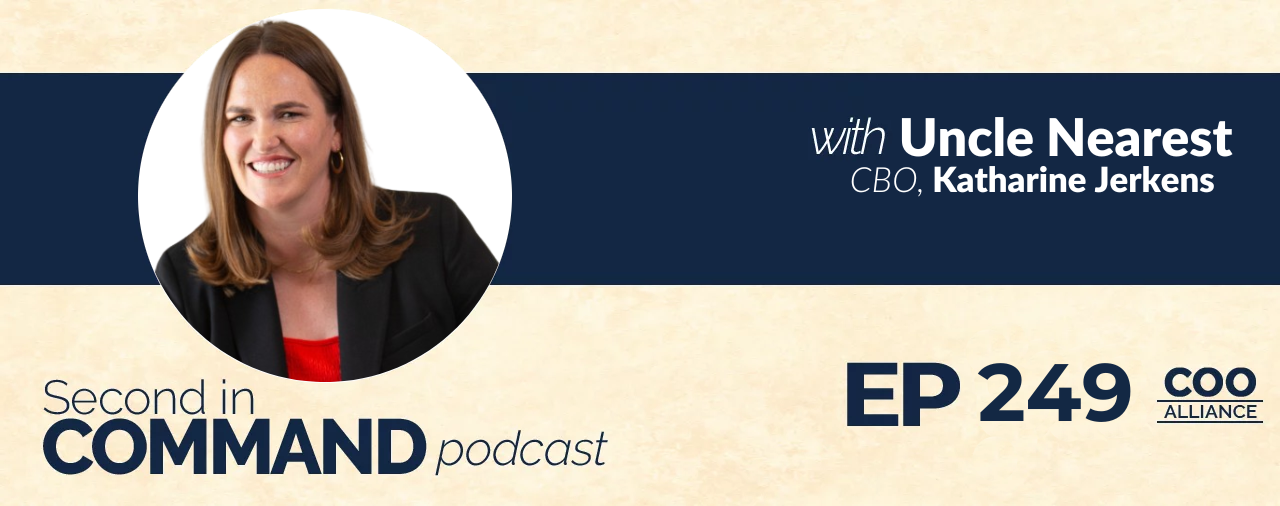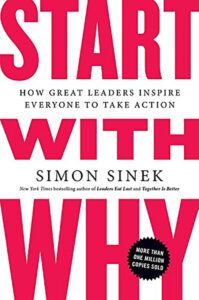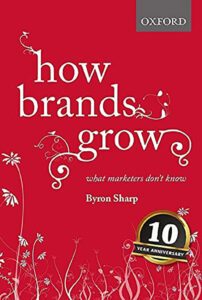Our guest today is Katharine Jerkens, COO of Uncle Nearest Premium Whiskey.
Katharine took the bold decision to leave her career of 15 years in the hotel business to help build what now is a very successful whiskey company.
With over 15 years of experience in the hospitality industry, Katharine brings a fresh perspective to the world of distilling. She helps solidify Uncle Nearest Premium Whiskey as the top premium spirits brand alongside distributors, bars, and restaurants worldwide. She joined the Uncle Nearest team before its launch in 2017 as employee #1 when founder and CEO Fawn Weaver approached her about starting the whiskey brand. Her extensive experience leading sales teams and ability to grow and cultivate global companies through her leadership has proven invaluable for the brand, which reached nationwide distribution in less than two years after the initial launch.
In This Conversation, We Discuss:
- The history of Uncle Nearest Whiskey and her path from the hotel industry to the world of whiskey distilling
- The challenge of rolling out to all 50 states in two years
- How they scaled the business during the pandemic and the necessary maneuvering?
- How they switched between on-premise business (hotels, restaurants, etc.) and off-premise business (grocery stores, etc.)
- How Katharine balances being a mom and a business executive?
Resources:
Connect with Cameron: Website | LinkedIn
Get Cameron’s latest book “Second in Command: Unleash the Power of your COO”
Subscribe to our YouTube channel – Second in Command Podcast on YouTube
Get Cameron’s online course – Invest In Your Leaders
—

Watch and Subscribe to our Podcast on Youtube
I am super excited about this episode. We had Kate Jerkens, who is the Chief Business Officer and second in command for Uncle Nearest Premium Whiskey as a guest on the show. You’re going to love the ideas and the passion that she is sharing. Also, the history of the brand, Uncle Nearest, and how they’ve built out the organization. She was employee number one. They’ve got well over 100 employees in the business that is raised well over $100 million.
I don’t know the exact number because they wouldn’t disclose it but my guess is over about $100 million because they’ve got $50 million in the distillery side of the business alone. It’s super interesting how they had to scale the organization during COVID, the bobbing and weaving that they had to do, and also, her passion around the core values and the culture side of the business too. I hope you enjoy the show. If you do, make sure that you like it, share it with your friends, and subscribe but we’ll see you on the inside.
—
Kate, welcome to the show.
Thank you so much for having me.
I’m looking forward to learning a little bit more about your story and the business as well. There’s something that’s cool about the business that you’re running. First off, you’re the first alcohol brand that we’ve had on the show. I don’t know why. I got to go and grab a few more for sure but then you’ve got the name Uncle Nearest Premium Whiskey. What does that mean?
Uncle Nearest is the first known African-American master distiller. He was distilling whiskey in the 1800s in Tennessee and was using a filtration process which is known as the Lincoln County Process to filter the whiskey through the charcoal from sugar maple trees. That process is what distinguishes Tennessee whiskey from Kentucky bourbon.
He was an enslaved man who’d been brought to a farm that was on our previous bottles. You can see the Dan Call Farm. He’d been brought there specifically to make whiskey for this preacher Dan Call. Over the course of time, he ended up being a mentor to others. We wanted to honor his story. When our founder heard his story in June 2016, no one had ever heard of Uncle Nearest, and it became her life’s mission to make sure that the world knew who he was. Without him, there was no Tennessee whiskey. He is the godfather of Tennessee whiskey.
We’ve got bourbon and you’ve got scotch and whiskey. Are you a rye whiskey, which is Canadian whiskey, or are you different?
No. Tennessee whiskey falls in the category of American whiskey. It has all the characteristics except bourbon. There are very strict guidelines for bourbon. It must be more than 51% corn. It has to be aged for a minimum of two years in new American oak containers. There are all these little pieces. Tennessee whiskey follows all that but to call yourself a Tennessee whiskey, A) You’ve got to be made in Tennessee, and, B) You’ve got to be using this extra filtration process, which adds anywhere from 6 to 12 weeks, if not more to the process because you’re cutting down trees, burning them, creating charcoal, and then filtering the distillate through that charcoal.
You said something funny to me before we went live as well. Your primary drink of choice is?
It’s Chardonnay. Fawn, our CEO, and her husband sent me an NDA and I was learning the story. They called me and are like, “This is what we’re going to do.” I distinctly remember. I was in the car with my brand-new son and I was like, “This is great but I drink Chardonnay. What do I know?” I learned a ton. I was a History major in college.
One of the fun things about this is that I geek out about the history of whiskey and bourbon in this country. Also, how much they played a part in building this country, the history of slavery, and everything. It was so fascinating to me. It started to add to my collection. I love our whiskey and trying other whiskeys. I like whiskey cocktails but I grew up in Sonoma County, California so I grew up with wine. I still drink my Chardonnay. I still give my whiskey some love as well, for sure.
I love that you’re so geek out on the history side of things, which is where a lot of the culture of the organization comes from as well. You bring that into the organization. It’s funny though that you’re like, “I drink Chardonnay.” Simon Sinek and I have been friends for over a decade. He was on our board of advisors probably four years before he wrote his book, Start With Why. I remember Simon calling me up one day and he said that he’d landed the Archdiocese of New Hampshire, the Catholic church as a client. I’m like, “You’re Jewish.” He goes, “I know. I was in the meeting and they said, ‘Are you a Catholic?'” Simon said, “I have faith.” I’m like, “That’s amazing.”
It’s like, “Do you like to drink? Yes or no?”
They asked the wrong question. You’ve been at the company as Chief Business Officer for a few years. Was it a startup when you got involved as well?
Absolutely. The article that was written in The New York Times by a writer named Clay Risen came out in June 2016. Fawn immediately was researching. I went to Tennessee. It was in September or October 2016 that I met with family members. She reached out to me at the end of November. By December 2016, I was working on this project. In the beginning, it was just a project. I knew there was a lot there.
I was coming from hospitality in fitness, sales, and marketing. This was new and the dynamics of this business are different than anything I’d experienced before. I wasn’t entirely sure how deep I was going or what was going to happen but I was employee number one. We were still looking at bottle shapes and labels and meeting with branding companies. I was in some of those original meetings where everyone was shooting things and figuring out what we were going to do. I think back to those times and be like, “God, I had no clue what was going on.” I’m just taking it all in.
A core thing that the COO or the second in command of an early-stage company has to be good at is not to be great at one thing. When you’re so good at one thing, it’s impossible to then manage all the other stuff that you think you need the experience for. Sometimes, it is a gut check. I remember being the COO at 1-800-GOT-JUNK? and I came in as employee number fourteen. When I left, we had 3,100 employees 6 years later but we were picking the colors of the company. I’m like, “I thought green and blue were terrible colors for 1-800-GOT-JUNK?” I wanted red and blue.
You lost that debate though.
Thank, God because I didn’t realize at the time that blue and green were going to be the colors of recycling and the Earth. I’m like, “That makes sense.” What was the organization with one employee? How many do you have in 2023?
On the Uncle Nearest, the brand side, we have over 50 but then we have our distillery, which has been built out. We’re a little over 100 employees.
What’s it like when you’re in an organization and it scales like that and changes? In the early days, you were the jack of all trades, the master of none, or the mistress of none to now, you were leading bigger parts of the organization. How have you had to scale?
It’s been a lot of shifts. To be honest with you, sometimes Fawn and my challenge is to let stuff go. At the very beginning, I was doing so many different things. Part of scaling is learning when you need an extra hand. In 2020, we finally hired a VP of Marketing. I was like, “I love that side.” It’s like, “If I didn’t have Lucia by my side, I don’t even know how I’d be breathing.”
We brought on some SVPs to oversee distributors and manage our teams throughout the US. Those were the toughest parts for me to realize that we had to add people for all of us to be successful but I also had to understand that it doesn’t mean I was not doing the right thing. For us to continue to grow and thrive, we needed experts and other people to help us.
That’s such a common thing. In one of our COO Alliance meetings, a lot of our members were talking about that same idea. In terms of letting go and bringing these senior people in, what’s the first shift that you had to go through in the mindset to be okay with doing that? Secondly, once you’re doing it, can you walk us through the step-by-step of how you bring in somebody great and someone senior into an existing organization?
Distribution on the liquor side is pretty interesting if this is a three-tier and four-tier system. Every single state has a different law about liquor and you have to hire a distributor in every single state. Let’s say our current partner, RNDC, handles 30-plus states. We contracted with them but then we still had to set something up in every single state.
While doing that, it was a big challenge to myself, Fawn, and Steve, who was my right hand from the very beginning. I was in charge of figuring out distribution, rolling it out to all 50 states, and getting that done in under 2 years. Our story was hot. We needed to get that done. Just so you know, the liquor industry looked at me like I was an absolute idiot. They were like, “You don’t do that seven at a time. You seed it.” We knew different and we had our goals.
I had a lot of ownership in all these 50 states. I was like, “I found all these. We all went out, rolled them out, and developed relationships.” I could not effectively manage 50 different relationships and hire proper people in all those markets. It was the first stage of hiring two extra people to help us. Those two men that came on had been in the business for many years. I was like, “That’s great but I’m the one who did all this upfront work.” It was hard for me to let that go but thank God for them because I’ve also learned so much from them.
I was doing pricing and doing things. I did a great job but there were other things that could have been done differently and better. They knew some different buttons to push. That was phase one. In 2020 when we were all forced to sit still for a little bit, in many of the markets that we have like in California, I had team members that couldn’t be out in the market at all with all the laws and the things that were happening.
We had a pause and we spent a lot of time developing marketing. Myself, Fawn, and Steve, who oversees our venture fund, read a book called How Brands Grow. We had a lot of conversations about our brands and what we wanted to do. We were able to spend a little bit of that pause time on developing branding and marketing. That was the moment where it was like, “We need another person here to help us do all that.” That part also was hard for me because I was like, “I’ve been doing this.”
We took our time. We had some people help us. We had our team members go out and look for appropriate people to fill that VP of Marketing role. We went through a pretty rigorous process. I would say the person we hired, Lucia, I can’t imagine doing this without her at this point. I didn’t realize how much I needed her until she started. We’ve been able to do so much more in the programming that we can do. We were doing everything right but we were able to do everything even better.
How were you funded?
We have investors. Fawn did an original round at the beginning and then she does all the fundraising. We have very loyal and incredible investors. We’re privately owned. She still is the majority shareholder and all that good stuff.
Can you speak to how much you’ve raised and how that has changed or has it changed your organization at all?
To be honest with you, I don’t have those numbers off the top of my head. I’ll say this. It’s an expensive business to be in. As I talked about the nuances of bourbon or whiskey, it has an age minimum of 2 years but out in this market, it’s 4 years. When you launch a business like this, you have to buy products. We launched with sourced products. That’s a lot of products to acquire.
The American whiskey market is very hot and there is not as much supply as there is demand. That’s an expensive undertaking. When Fawn and her husband, Keith, found our distillery site, which is a 300-plus acre farm in the middle of Shelbyville, Tennessee, which is halfway between Nashville and Lynchburg, they were like, “This has to be our home.” They knew that but that had to be a whole other raise.
Out in the press, it’s a $50 million project to build that distillery. That distillery is our home base. It’s bringing in visitors from all over the world, helping us build the brand, and giving us legitimacy. People are like, “There was this brand. They sourced but we’re making our product. We have a place we can go and learn about the story. It was incredibly important.” I can give you something like that between all the money we had used to source to build out the distillery.
For the company and how old we are and where we are, we have a pretty big team. Our goal was to get out into the market as quickly as possible and ensure that everybody knew this story as quickly as possible. We have great investors and people that are loyal to our brand. Fawn has a long list of people that reach out on a daily basis wanting to invest money in this brand. I don’t think we’ll ever have a shortage and there’s never going to be any concerns on that end. She’ll tell anyone, look you in the eye and people don’t even believe me.
I’m like, “I’ve looked her in the eye.” The company is meant to be a private company. There are no plans to sell or put it out to market. The story of Nearest was lost for so much time. Her goal is to build up this legacy, build up the story, and build it to a place where Nearest’s name and face will be carved into the Mount Rushmore of whiskey like Jimmy, Jack, Johnnie, and Nearest. That’s where we’re at. People see us moving fast and they’re like, “Why are you doing that?” It’s because there’s a lot of time to make up for it. We only have so much time on this Earth to get done what we want to get done. The goal is to leave this to others to continue to drive this legacy.
I can see why you’re so good in this second commander role too. You believe in the culture of the organization. You buy into it. You believe in it. It sounds like you’ve got a good relationship with Fawn, the CEO as well. Has it always been easy, the relationship with her, or do you struggle at times in the relationship? When you do, how do you get through those?
Fawn and I have known each other for years. In our twenties, we are both working in this cool new hotel in Santa Monica. It’s called the Viceroy Hotel. She was on the events side and I was on the room sales side but we were both salespeople. We both worked hard and we were both overachievers. We stayed in contact. She moved on and did her thing. I moved on and did my thing. In 2015, she reached out to me out of the blue. I was the Director of Sales and Marketing at a luxury property in Beverly Hills with a crappy commute and two small children. The hotel business is tough. I was managing a team of eighteen on the property. It’s a lot of hours.
She reached out. In my mind, I don’t know if she even knows this but I needed a shift. I was teaching spin and yoga on the side because I loved it and it was pure pleasure of mine. I was teaching at 5:30 in the morning, getting dressed, and then going to work because I loved it. I knew there was something in my mind I wanted to do on that side of the world.
She reached into me and I ended up being able to leave the hotel business. I worked with her on a project for about a year and a half and the Uncle Nearest story came to life. She and I have a good relationship. She treats me fairly. She’s always been amazing to me. I love her and Keith. She loves me and Allen. Funny enough, we had an investor’s event. She’ll tell you too. She believes my daughter Reese is going to be the next CEO and introduced her as such. Those are some cool things.
My dad passed away in March 2019. Her dad and my dad had the same name and both died of the same cancer. I remember telling her and it was tough. She, from what I understand, told everyone in the company, “Do not reach out to Kate unless it’s to tell her you’re sorry and to give her a hug until she is ready.” She was very serious like it would be a big problem if you did. On the day of my dad’s funeral, I saw these cars pull up and it was like a clown car. Every person in my company at that time was at my dad’s funeral.
She’d paid for everyone to fly out and we’re in California. My family was all like, “That happened.” It was an amazing moment. Fawn does not pull any punches and sugarcoat things. She is as direct as they come and that doesn’t work for everybody. It works for me. She and I have had to have conversations. I’ve had to learn a lot. Business is not personal. There’s got to be a separation. For me, growing up as a people pleaser and somebody who doesn’t want anyone to be mad or upset, directness was not always easy because it feels like, “Are they mad,” but she’s not.
If she’s telling you something’s not working or she needs something, she’s direct about it. It takes a lot of learning for people. I’ve learned that. That’s how our relationship continues to evolve. There are moments when I’ll text her and say, “Can I run something by you?” Maybe I read something she wrote or we were having a conversation. I didn’t understand her point and I can think about it. I’ll call her and be like, “Can we have this conversation?”
I want to understand. I’ve learned a ton from her. Building this business has not been easy. Those first few years were tough but also, I was learning so much. It was so amazing. You’re seeing the recognition of everything happening but behind the scenes, not knowing 100% what I was doing all the time was pretty tough.
How do you work through those stages when you don’t know what you’re doing? Is it fake until you make it?
Sometimes, it was fake until I make it and stand like, “Yes, I know this is what we’re going to do.” I also found people. There were people that believed in the story, in me, and the passion of all of it, and would become mini mentors. Some of those people aren’t even in the business anymore but there were people that would try to help. There were also people that wanted to pat me on the head and be like, “It’s cute that you want to do this but this is not going to work,” or whatever it was. Those guys, I pushed aside.
One of the things that’s important in this business is I wasn’t interacting with any women. A lot of what was happening was men. A lot of White men and men had been in this business for a long time and had seen it all done one particular way. That part was challenging to make our way through those weeds. There were times when people wouldn’t call us back. It took Keith calling them or emailing them. They’d then be like, “Yes,” and then he’d turn them over to us.
Those were some learning things in the business. The thing we always do is there are so many new brands. I talked to our distributor partners. They have to weed through so many new brands. Everyone thinks they’ve got the greatest new vodka. I don’t even know how you can keep coming up with a new vodka. Vodka is vodka. It serves its purpose but there are a million vodkas, tequilas, and whiskeys.
No one had our story and that was different. It wasn’t like, “Fawn fell on her head on a hike one day and saw the sky guy. We created this label based on her vision and here we are.” It’s like, “No, we’re bringing history to light. We’re bringing in a man’s story, an African-American man’s story. A story that was lost in time.” If you look at Tennessee whiskey brands like Jack Daniels and George Dickel, the list goes on, there’s no Tennessee whiskey without the Nearest contribution. Without him teaching that filtration process is what differentiates it. That was a big key.
It’s also super cool that it’s a women-led organ organization doing it. That’s got to be rare in the industry.
It’s extremely rare. An African-American woman, especially running it and owning it is not heard of. Yes, we are different.

Premium Whiskey: It’s extremely rare for an African-American woman to own and run a business.
Fawn is African-American as well. I was wondering what the tie-in was going to be on the politically correct side of things. That connects the dot there pretty easily. It’s not like you’re leveraging something you shouldn’t be. It’s leveraging something that seems natural at that point.
People thought she was part of the family, which is what’s funny but no. There are so many stories untold. If Nearest’s story had been lost in time and it turned out he invented why we all drink coffee, we’d probably be selling coffee and celebrating him there. It’s this twofold thing. It’s continuing to bring African-American stories and Black stories to life. The other piece of where we are is showing people what we can do as an African-American-owned female-led company. We also mentor and help a lot of other companies because this hasn’t been done before.
I love that you’re so enamored and entrenched in the story. It’s such a big part of the DNA. Building any great business has to be a little more than a business and a little bit less than a religion. It’s got to get into that zone of a cult. It feels like Uncle Nearest is a bit of a cult culture in a good way.
In a healthy way.
You don’t go too far. What’s your culture like? How would you describe the company culture itself?
Our company culture, first of all, is extremely important to us. Our culture is everything. We speak to each other like we’re family. We have guiding principles. Fawn put pen to paper on the guiding principles about a year into the business and then had a group of us weigh in on them. We debated and came up with these guiding principles of everything pound the rock. It means that every day we pound the rock and one day, it’s going to break.

Premium Whiskey: Workplace culture is everything. Treat each other within the team as family.
That’s what we’ve had to do to leave a legacy behind. Family time is extolled. It is quiet time. Fawn works six days a week. That’s not the expectation for everyone else. She loves to work but she takes a Sabbath on Sundays and she does not work. She won’t do anything with work. She spends a day with her husband and her day doing nothing. If anything feels like work, she’s not doing it. There are things like that that she’s big on.
We have two weeks in a year. One in December and one in July where she’s shutting down the company because what she found is the way our culture was is that everyone loves to work and we’re working hard but if I go on vacation, I’m on my Slack and email. I’m not actually on vacation. If I’m emailing, then people are going to email me back and then it’s a cycle. I’m using myself as an example.
She has two weeks of, “We’re shutting down.” It means you can’t Slack or email someone. Everyone’s going to shut up for a week at a time, try to reset, and be ready to finish or start the year. That’s a big part of the culture. She sent out an email right before it started in December and was like, “I’m serious.” The first time that you send an email to your colleague, you’re then opening that door. It’s like, “If that person’s working, then why I am not working,” or whatever it might be.
Long story short, we love each other. A colleague, unfortunately, lost his son unexpectedly in 2020. Even though nobody was flying at the time or doing anything, 80% or 90% of our company got on planes and went to his funeral to be there to support him. We’d all been like, “We’re going to be strict. Masks on and no touching. Everyone was in their aisle when we were on the bus.” Within five minutes of that, everyone’s like, “I haven’t seen you in so long. I missed you.” It is a family-like culture but we all also work our asses off too.
How was it for the organization during COVID? You were in the almost launch phase of a business. How did you adapt? What changes did you have to make? How did you get through it?
A lot of the people we had hired at the time, we’d hired to help us build our business through the on-premise, which we call bars and restaurants. That was what was hit the hardest. There was a lot of pivoting to having to go out and support and make sure we had our footprint. We already had been but we were focusing so much on bars and restaurants. We focused on the off-prem, which is the grocery stores.
Also, dialing into eCommerce. We launched selling online. We were ahead of the game versus a lot of other folks. All this new eCommerce emerged and grew. We had to get in there quickly. We evolved our digital marketing strategies quite a bit. As states started to allow to-go cocktails and things like that, we jumped on that and created fun mason jars and all these different things so we could help support the bars and restaurants doing to-go cocktails.
We were able to do a lot of stuff and pivot quickly because we’re a small company. It was like, “Let’s try this and that. Let’s do that.” That kept our team motivated and fun. At the time when we were quarantined and you couldn’t do anything, we had the team out writing plans. The plans were all marketing-based. It was like, “Once we open up again, how are you going to hit the ground running?”
Those were important to keep the team motivated and for us, to continue to do business differently. We didn’t lose a single person during COVID. As time went on, we started adding people because what we realized is we had markets. We were managing from afar but we needed people on the ground in those markets so that we didn’t lose any foothold while there were so many restrictions in place.

Premium Whiskey: The key to not losing a single person during COVID was to keep the team motivated and continue doing the business differently.
It sounds in many ways, it was the whole, “What doesn’t kill us makes us stronger.” You guys sound like, “We’re entrepreneurial enough and could bob, weave and adapt.” Do you think that there were some big strengths that came to your organization because of COVID? Did it set you up for some of the success you’re having?
Absolutely. I was in Los Angeles. It was on Friday, the 13th, I remember when I got the email like, “Come and get your kids for two weeks.” The mayor of Los Angeles is on the radio saying, “Let’s stay home from bars and restaurants.” I’m like, “What a jerk. Don’t do that to our industry. Why would you do that?” I’m telling my kids, “We’re going to go to restaurants. We’re going to support.” Over the weekend, you get to Monday and everything’s shut down. Within a week, it has changed so much.
One of the things that was incredible for our company is Fawn that Tuesday got all on a company call and said, “Everyone’s jobs are safe. We’re good. This is what we’re going to do.” We continue to do those kinds of check-in calls with the whole team. We check in on everyone’s mental health. We make sure everyone was doing okay and encouraged them to look and do things differently.
I will say that time helped our team develop some stronger sales and marketing skills for myself, Fawn, Steve, and Lucia, whom we brought on. It helped us hone in on our branding and our marketing and who we were going to be. We learned to be able to pivot quickly. Being a smaller organization, we had that. We didn’t have to go through a lot of layers to figure stuff out. We started throwing things out there and trying new things. A lot of that is why we ended up continuing to grow during that time.
I want you to think about growing but I want to think about your growth. What are you focusing on as a leader? Where are you growing in terms of your skillset?
There’s a lot of innovation at the very beginning and then there’s been a lot of management and figuring things out. For me, it’s about innovation and creativity, getting into that, and looking at new ways to do business, new ways to market, and new ways to sell. I’m digging into the global market a little bit more and figuring out what our next steps are there.
I’m putting myself through a chief marketing certificate through Kellogg because I want to learn more. Everything I’ve ever done has been learned on the job and I want to make sure there are things I’m not missing as well. The other piece goes back to what I talked about at the beginning. I have tendencies. I’m a fun person. I’m humorous. I like to be the life of the party. I’m an extrovert and all those things but also continue to learn to take out my toughness and flex my muscles a little bit when I need to.
Can you speak to the whole being a mom and being an executive and a leader? How do you balance that as well?
I grew up with parents that worked and they both worked a lot. I had babysitters after school and all that stuff. That’s how I watched and what I was mirroring. In this role, it’s tough because there’s travel. I work from home. During the day, I’m going but the kids come home and I’m still a mom working, not just a mom. The partner I have in my life, my husband, grew up with his mom who raised them and started a business and runs her business. He’s very supportive and loves to see women doing that kind of stuff.
He has a great job but has flexibility as well. I have a partner in crime 100%. It’s funny. He’s traveling for the first time in a couple of years for his job. They’re finally on the road. I’m single parenting. I’m like, “How’s he been doing this?” It is about your life partners and who’s out there supporting you. My kids and I are surrounded by a great community and a lot of my female friends are all badass women working as well. We’ve got a carpool situation and all the things. That’s a lot of it.
My kids are proud. For a long time, they were giving me things when we walk into Whole Foods and you couldn’t see Uncle Nearest anywhere. They see that and they’re proud. They know that we have to always walk by the bottles to make sure they look okay and all the things. There’s a lot of pride in that. When we were on the cover of the American Whiskey Magazine, it was at Whole Foods. I had this video of my little guy. I was like, “Who’s that?” He’s like, “That’s Mama.” We had this badass and I’m like, “What’s Mama doing on this magazine?” He goes, “Mama’s mad.” We were all mad mugged but it’s fun for them.
I try to keep them up to speed with what we’re doing and I want to model that all of this can be done. On the weekends, they’re all mine. I overcommit to stuff in their lives, which I’m working on but I’m the president of our PTA, which is probably a questionable decision from a time standpoint. I coach my little guy’s soccer. I do a lot of stuff so that they also know that I’m there for them.
You’re also grooming the future CEO of Uncle Nearest.
I have a big responsibility. I got to show her this is cool. I can’t have a meltdown about work in front of her. She’s never going to want to take the role.
You’re going to have to report to your daughter pretty soon too.
It’s so cute. She said she’s going to buy me a house someday when she’s the CEO. I’m like, “I have a house. I’ll be buying my second home then and you can worry about you.”
Let’s go back to the 21 or 22-year-old Kate Jerkens or pre-Jerkens and you’re just Kate. What advice would you give yourself when you were 21 or 22 that you know to be true now but wish you’d known back then?
Learn patience. I was in a big hurry for a lot of stuff. No matter what job you’re in and whatever that job might be, people are always watching. Doing your best and being excellent at what you’re doing matters even when you think you’re in a job that’s menial and people aren’t paying attention to. I’ve done everything. I have worked at hardware stores, made keys, and mixed paint. I babysat. I’ve worked at travel agencies and sorted tickets. I’ve done it all but I’ve always done work in an excellent manner, in my opinion.
When I met Fawn, I was 24 or 25. She remembered my work ethic from that and that’s the thing. It’s patience because as a twenty-something-year-old, I wanted to be moving fast and I did. I was a VP by the time I was 28 years old or 29 years old but I wish I’d had a little more patience and could have sat back and learned a little more here and there. However, I would say to anyone that in every job you do, you do it with excellence because you never know who’s watching you.
I’ve never heard that one before and it’s so true. Kate Jerkens, the Chief Business Officer for Uncle Nearest Premium Whiskey, thanks so much for sharing with us on the show.
Thank you. It’s so nice to meet you. I appreciate it.
You as well.







